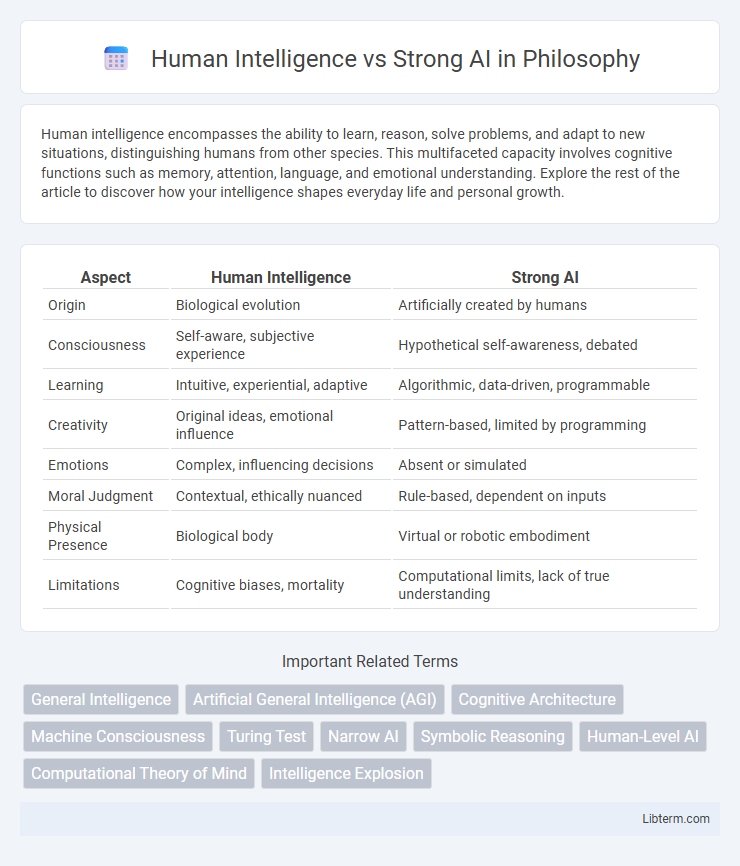Human intelligence encompasses the ability to learn, reason, solve problems, and adapt to new situations, distinguishing humans from other species. This multifaceted capacity involves cognitive functions such as memory, attention, language, and emotional understanding. Explore the rest of the article to discover how your intelligence shapes everyday life and personal growth.
Table of Comparison
| Aspect | Human Intelligence | Strong AI |
|---|---|---|
| Origin | Biological evolution | Artificially created by humans |
| Consciousness | Self-aware, subjective experience | Hypothetical self-awareness, debated |
| Learning | Intuitive, experiential, adaptive | Algorithmic, data-driven, programmable |
| Creativity | Original ideas, emotional influence | Pattern-based, limited by programming |
| Emotions | Complex, influencing decisions | Absent or simulated |
| Moral Judgment | Contextual, ethically nuanced | Rule-based, dependent on inputs |
| Physical Presence | Biological body | Virtual or robotic embodiment |
| Limitations | Cognitive biases, mortality | Computational limits, lack of true understanding |
Defining Human Intelligence and Strong AI
Human intelligence encompasses cognitive abilities such as reasoning, learning, problem-solving, emotional understanding, and adaptability, rooted in biological neural networks. Strong AI, or artificial general intelligence (AGI), refers to machines designed to perform any intellectual task that a human can do, exhibiting self-awareness and understanding beyond narrow, specialized functions. Defining these concepts highlights the contrast between organic cognitive processes and synthetic systems aiming for human-level versatility and consciousness.
Historical Perspectives on Intelligence
Human intelligence has evolved over millennia, rooted in biological processes and shaped by cultural, social, and environmental factors. Historical perspectives on intelligence highlight cognitive development, problem-solving, and adaptation as core components that distinguish human intellect. In contrast, the concept of Strong AI emerged in the mid-20th century, envisioning artificial systems capable of replicating or surpassing human cognitive functions through advanced algorithms and machine learning.
Key Characteristics of Human Intelligence
Human intelligence is characterized by adaptability, emotional understanding, and the ability to learn from diverse experiences, enabling complex problem-solving and creativity. It integrates sensory perception with intuition and consciousness, facilitating nuanced decision-making and empathetic interactions. Unlike artificial systems, human intelligence exhibits self-awareness and moral reasoning, crucial for social and ethical considerations.
Fundamental Traits of Strong AI
Strong AI possesses fundamental traits such as the ability to understand, learn, and apply knowledge autonomously across diverse domains without human intervention. It exhibits genuine consciousness, self-awareness, and intentionality, enabling complex reasoning and emotional understanding comparable to human intelligence. Unlike human intelligence, Strong AI operates on vast computational power and algorithmic precision, allowing it to process and analyze data at unprecedented speeds and scales.
Cognitive Processes: Human Minds vs AI Systems
Human intelligence relies on complex cognitive processes such as perception, reasoning, learning, and emotional understanding, which are rooted in neural structures and biochemical interactions. Strong AI systems emulate these processes through advanced algorithms, neural networks, and machine learning models designed to replicate human-like reasoning and decision-making capabilities. While human cognition integrates consciousness and subjective experience, AI systems process data deterministically and lack genuine self-awareness despite achieving functional similarities.
Learning, Adaptability, and Creativity
Human intelligence excels in learning through experience, enabling nuanced understanding and emotional context, while strong AI relies on advanced algorithms and vast data sets for pattern recognition. Adaptability in humans stems from cognitive flexibility and the ability to generalize knowledge across diverse domains, whereas strong AI adapts through machine learning models optimized for specific tasks. Creativity in humans arises from imagination and abstract thinking, contrasting with strong AI's generative capabilities driven by neural networks and computational power.
Ethical Implications in Human and Strong AI Intelligence
Ethical implications in human intelligence revolve around autonomy, moral responsibility, and the capacity for empathy, which guide social interactions and decision-making. Strong AI presents challenges including accountability for decisions made by autonomous systems, potential bias encoded in algorithms, and the risk of surpassing human control. Addressing these concerns requires robust ethical frameworks and transparent AI governance to ensure alignment with human values and rights.
Emotional Intelligence: Human Uniqueness or AI Potential?
Emotional intelligence, defined by the human ability to perceive, understand, and manage emotions, remains a core aspect of human uniqueness that current strong AI systems struggle to replicate authentically. Strong AI aims to simulate emotional responses through advanced algorithms and machine learning models but lacks genuine experiential understanding and empathy inherent to humans. Ongoing research in affective computing seeks to bridge this gap, enhancing AI's potential to recognize and respond to emotional cues in real time.
Current Limitations of Strong AI Compared to Humans
Strong AI currently struggles with understanding context and exhibiting genuine creativity, areas where human intelligence excels due to complex cognitive processes and neural flexibility. Unlike humans, Strong AI lacks emotional intelligence and intuitive reasoning, limiting its ability to make nuanced decisions in unpredictable environments. These limitations highlight the gap between algorithmic processing and the adaptive, experiential learning inherent in human cognition.
The Future of Human Intelligence and Strong AI Synergy
The future of human intelligence and strong AI synergy highlights a transformative era where cognitive augmentation and advanced machine reasoning coalesce to solve complex global challenges. Integrating emotional intelligence and ethical judgment with AI's computational power facilitates unprecedented innovation in healthcare, education, and scientific research. This collaborative intelligence model promises enhanced decision-making, creativity, and personalized experiences that drive societal progress.
Human Intelligence Infographic

 libterm.com
libterm.com